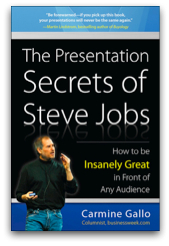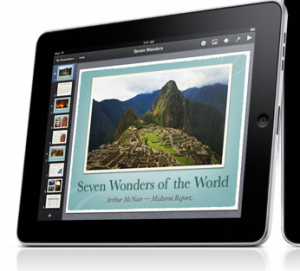 The Presentation Secrets of Steve Jobs: How to Be Insanely Great in Front of Any Audience
The Presentation Secrets of Steve Jobs: How to Be Insanely Great in Front of Any Audience
Carmine Gallo
2010 McGraw Hill
I've read quite a few books on preaching, communication, and public speaking in my time. In fact, most people don't know this, but two decades ago, I spent my freshman year in college as a speech major. I eventually changed my major after asking myself the profound question, "Exactly, what am I going to do with this degree?" but not before I completed the advanced public speaking course (with an A, thank you!) that my university offered.
I still remember the prof in that advanced course making the comment that the average audience no longer had an attention span of more than about twenty minutes. This was the eighties, mind you, and if this comment were true, it would undoubtedly be even less today. Of course, when I mentioned this twenty minute attention span to my pastor of the time (whose sermons averaged 45 minutes), he was quick to say, "Well, I certainly don't agree with that." Interestingly, Gallo points out in the book that
"Speeches written for John F. Kennedy, Ronald Reagan, and Barack Obama were scripted to last no longer than twenty minutes."
By the time I was working on my M.Div in the early nineties, I was (sadly) a bit of a public speaking snob. Unimpressed with the two preaching professors at my seminary at that time, I found a loophole in my required coursework and substituted a communications course and a Christian journalism course at another institution. Looking back, that was my loss as I was too arrogant to think that I could actually learn something from these two men.
These days, I'm regularly in front of an audience for one reason or another (usually in either a church or classroom setting), and I'm even fortunate enough to have taught a college-level public speaking class five times in recent years.
The Presentation Secrets of Steve Jobs by Carmine Gallo interested me for a couple of reasons. I suppose someone has "arrived" as a presenter when they joins the ranks of Abraham Lincoln or Winston Churchill as the subject of books written about their public speaking styles. Most would agree—even the detractors—that Steve Jobs is a master presenter. Having seen most of Jobs' keynotes over the last decade or so, I was very interested to see them put under the microscope with the intent of finding a few core principles for speaking success.
Also, this was the first communications book I'd seen that thoroughly integrated the use of presentation graphic software with the content. Most communication books that I've come across treat this as a separate subject, reserved for a chapter on its own. I've followed the same principle in the communications classes I've taught, reserving a separate section of the class for discussion of presentation software. While Gallo says the principles in the book apply whether one uses PowerPoint or Keynote, my connection to Jobs lies in the fact that we both use the latter. And everyone I've ever met who has used Keynote finds it much superior to PowerPoint.
As one might expect, the book is interspersed with transcripted excerpts from Jobs' presentations over the past decade or so. I could imagine that this would make of an exceptional electronic book if the transcripts could be replaced with actual video clips. Of course while all of these video clips can be found on YouTube, the fact remains that this is not an authorized/endorsed treatment of Jobs' presentation style, so no doubt there would be copyright issues involved.
The book's 18 chapters each deal with one aspect of Jobs' presentations principles, although not all these principles are unique to Jobs. The old stereotypical three-point sermon outline has some merit to it evidently. People remember things in threes easier than much longer lists. Gallo demonstrates that Jobs takes advantage of this rule of three as well. The chapter "Answer the One Question that Matters Most" deals with narrowing your topic, your thesis (to use a label I refer to in my classes) to a single idea. The value of rehearsal is emphasized throughout the book, and one that I've tried to hammer over and over to my students. When I have a student taking 12 minutes to deliver a speech intended to fit into a three to five minute time limit, I know there's been no rehearsal involved. According to Gallo's sources, Jobs practices hours and hours before a presentation, sometimes starting weeks in advance. No wonder he makes it look so effortless.
The value of the book for me lies in its interrelation with technology. Gallo has one chapter titled "Create Twitter-Like Headlines" referring to soundbites that can be reproduced in 140 characters or less. These are short statements that stick in people's minds and summarize the content of the presentation. Examples are given such as
MacBook Air: the world's thinnest notebook
(2008)
Today Apple Reinvents the Phone
(iPhone announcement, 2007)
The Excitement of the Internet, the Simplicity of the Macintosh
(iMac announcement, 1997)
One Thousand Songs in Your Pocket
(iPod Announcement, 2001)
As already mentioned, I was keenly interested in principles surrounding Jobs' use of presentation software, particularly Keynote. In light of such things as "Death by PowerPoint" in which this kind of software can become "a convenient prop for poor speakers," I've often internally struggled with the right use of software during a presentation. Clearly PowerPoint or Keynote can be abused, misused and overused. I've seen it used in some contexts where it really wasn't necessary at all. When I used to teach high school from 2000 to 2005, I often used PowerPoint on a television screen to keep my teenage students facing forward (turn on a television in the conterxt of any group, even with the sound off, and watch how people will continually move their gaze to the screen).
In the classroom, I use Keynote for some things, but not everything. I'm well past feeling the need to have a screen present at all times to keep attention. Of course, I teach college students now, which might make some difference. But I also use Keynote most Sundays in a Bible study class I teach at my church. We usually have around 40 in attendance on any Sunday morning, and it can be very helpful—especially for things such as large scale maps, photos of the holy land, and emphasizing points in a biblical passage.
I try to keep our study discussion oriented, so I usually project my questions on the screen as well. At one point, I'd decided to stop doing this because I thought it was a bit superfluous. I'd even considered dropping any use of presentation software on Sunday morning at all. I don't want to use technology simply for the sake of technology. However, we have on some Sundays up to four nationalities in our study. Three of these four hold English as a second language. At about the time I'd decided that I might ditch using software altogether for our study, a Korean member of our class mentioned to me how much he appreciated my projecting the questions on the screen. Hearing me ask the question and being able to read it at the same time really helped him understand what I was asking.
Okay, so if I'm going to use presentation software like Keynote, I want to do it well. I don't want to have something on the screen merely for the sake of having it there. In reading The Presentation Secrets of Steve Jobs, I discovered a number of principles that have already made a change in the way I use Keynote.
Did you know that Steve Jobs never uses bullet points? I'd never thought about it, but it's true. As a teacher, my slides are filled with bullets—at least until I read Gallo's book. I mentioned this to a friend a couple of days ago. "What's the big deal about bullets?" he asked. According to Gallo, bullets send an unspoken message to the audience member to take notes. It defers the attention from the speaker and what's being said. If we follow Jobs' example and Gallo's advice, we want to limit one idea per slide. We want to keep things simple, to channel their inner zen, to use the theme of ch. 8. Gallo points out that Jobs generally only uses only as much text as necessary—think of those 140-character Twitter-like statements—and an image. I've always told my students that the software should not be the presentation. They are the ones giving the presentation and the software should simply reinforce what they're saying. Well, this idea of a limited number of words with an image on a slide helps keep the focus on what the presenter is saying while giving a visual cue to help the listener remember the content.
Gallo includes numerous charts in the book that demonstrate what Jobs actually said compared to the brief amount of content on his Keynote slides.
I'm scheduled to teach a philosophy class in May and June. I've taught the class before, and although I work hard to keep my "lectures" discussion based, my Keynote slides for this course are made up of one slide of bullets after another. I'm definitely going to have to rethink what I present visually during our discussions.
Gallo even includes a chapter on what to wear during a presentation. Steve Jobs can wear sneakers, blue jeans, and a St. Croix mock turtleneck (my father works for St. Croix incidentally), but Gallo tells us that we probably can't get away with that. It might even get us fired! Rather, Gallo suggests that if we want to succeed in our presentations and in our careers in general, we ought to dress slightly better than our co-workers. These days that doesn't take too much effort.
My context for speaking in front of audiences is often church-related. Although this book is not directed at the church, and in spite of the myriad of books on preaching, I believe there's a lot that ministers could learn from this book. I remember reading a decade and a half ago that studies have shown that one of the most boring things viewers see on television is the talking head. And yet for churches that televise their services, this is mostly what is offered. But the same can be true even in a live setting. Honestly, have you ever sat in a church service, listening to a sermon, and found yourself to be bored out of your mind? Has your mind ever wandered? These are rhetorical questions.
Remember what my college prof said in the eighties about folks only having 20 minute attention spans? It may be worse now. Gallo writes that
"Your audience checks out after ten minutes. Not in eleven minutes, but ten. We know this valuable fact thanks to new research into cognitive functioning. Simply put, the brain gets bored."
So now, we're down to ten minutes! Obviously Steve Jobs speaks for more than ten minutes (his presentations are about an hour and a half on average). I also know for a fact that only first sermons are ten minutes long! Most are 30 minutes are more. So what can you do? Gallo says to do what Steve does: don't let the brains of your audience get bored. Add variety. That may be a video clip or an onstage interview. Maybe it's simply to stop the technical exposition of a Bible passage and offer a relatable story. Don't worry—Jesus did that last one a lot. They're called parables.
Keeping brains alert is not necessarily the same as entertainment. I realize that the goal of the Sunday sermon is not to entertain. But the average sermon is still based upon methods geared toward strictly passive oral learning of a pre-modern age. People have different learning styles and effective communicators use this to their advantage. The message can remain the same, the message can still have depth, but I don't think we have to be boxed in regarding how it's communicated.
One more thing...
I love the title of the book's second chapter: "Develop a Messianic Sense of Purpose." Gallo points out that when Steve Jobs speaks, he's not simply trying to sell you an iPod, or a Mac, or an iPhone. He sells the experience. He describes how your life will be enriched through these devices. Going all the way back to Apple's beginnings in the seventies, it wasn't about simply selling personal computers to Jobs. He had a vision to change the world.
If you teach or preach the Bible, how's your vision? I said my questions above about getting bored in church were rhetorical. But I will tell you that I've sat through many sermons in my life (my present church excluded, of course!) in which I had absolutely no indication that the speaker had any vision for changing the world based simply upon his boring presentation and overall lack of enthusiasm. If we don't believe in what we preach, it shows. We offer the Good News of Jesus Christ, a peace that outlasts the latest gadget. Messianic sense of purpose, indeed.
If you want to see the principles Carmine Gallo outlines in The Presentation Secrets of Steve Jobs applied to the iPad announcement, see Gallo's article "The Secrets of Steve Jobs' iPad Presentation" at Cult of Mac.
 Friday, April 2, 2010 at 9:04AM
Friday, April 2, 2010 at 9:04AM  I live in Simpsonville, Kentucky, one county over from Louisville, Kentucky, which is home to an international hub for UPS. Evidently, all iPads will stop in Louisville on their way from China to purchasers' homes and businesses. Anyone who has been trying to track their iPad shipment this week on the UPS website has seen their packages go from China to Louisville and then see the Louisville references disappear from the tracking detail. Although I've confirmed via a response from UPS contact email that my iPad will arrive on Saturday, I wouldn't know that simply from looking at my tracking information. There is nothing under the column of delivery date.
I live in Simpsonville, Kentucky, one county over from Louisville, Kentucky, which is home to an international hub for UPS. Evidently, all iPads will stop in Louisville on their way from China to purchasers' homes and businesses. Anyone who has been trying to track their iPad shipment this week on the UPS website has seen their packages go from China to Louisville and then see the Louisville references disappear from the tracking detail. Although I've confirmed via a response from UPS contact email that my iPad will arrive on Saturday, I wouldn't know that simply from looking at my tracking information. There is nothing under the column of delivery date. Apple,
Apple,  UPS,
UPS,  iPad in
iPad in  Technology
Technology 









